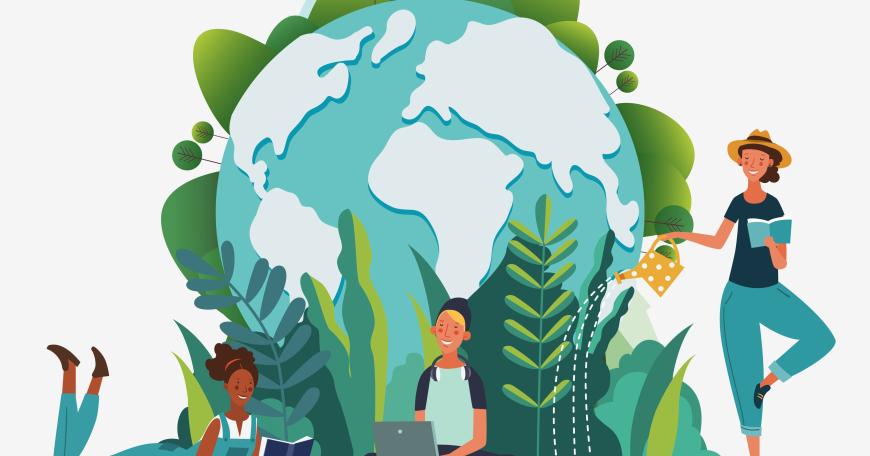
Make every day Earth Day with free educational materials from MIT
Image: Qvasimodo, iStock
Take action with online courses and other resources about climate change from MIT, MIT OpenCourseWare, and MITx.
By Katherine Ouellette
We celebrate Earth Day once a year, but working toward a sustainable future is a full-time endeavor. From sharing the latest research, solutions, and educational resources through open source platforms like MIT OpenCourseWare, MITx, and MIT RAISE’s Day of AI — all part of MIT Open Learning — to answering pressing questions on the Today I Learned: Climate podcast, the MIT community is committed to addressing climate change year-round.
This Earth Day, and every day, explore free courses from MIT OpenCourseWare and MITx, podcasts, and other engaging resources on the MIT Climate Portal to learn about renewable energies, climate justice, sustainable infrastructure, and more.
The science of climate change
Cities, forests, coastal ecosystems, and everywhere across the globe are affected by climate change. What’s causing these changes, and what can we do about it? Can recycling and net zero emissions help mitigate the damage of rising sea levels and air pollution? Build your foundational understanding of climate change science with the award-winning MIT Climate Primer and more.
Courses
Educator guides and activities
- Day of AI: Ecobit Explorers
- Day of AI: Making Sense of Our Surroundings
- Day of AI: Telling Climate Stories with Data
- MIT Climate Educator Guides offers over 140 free, classroom-ready, adaptable activities that are paired with short, science-driven episodes of Today I Learned: Climate podcast.
Podcasts
- About recycling
- Can desalination solve water scarcity?
- Wait, how do greenhouse gases actually warm the planet?
- Won’t more CO2 help plants grow?
Other resources: Ask MIT Climate
Renewable and carbon-free energies
Are all renewable energies also carbon-free? How do wind, solar, hydropower, biomass, and geothermal energies work, anyway? Learn how renewable and carbon-free energies will propel us towards a cleaner and greener future.
Courses
- Fundamentals of Advanced Energy Conversion
- Nuclear Energy: Science, Systems, and Society
- Sustainable Energy
Podcasts
- About hydrogen energy
- Energy storage: Keeping the lights on with a clean electric grid
- Why does it take five years to build a wind farm?
Climate justice and policy
How do we address the basic human rights threatened by climate change? Can climate justice alleviate the burdens of loss and damage more fairly? Discover how policymaking, diplomacy, academic study, and activism are tackling these challenges.
Courses
- Energy Economics and Policy
- Environmental Justice Law and Policy
- Urban Energy Systems and Policy
- Water, Climate Change, and Health
Educator guides and activities
Explainers
Podcasts
Sustainable transportation and infrastructure
How are planes, trains, automobiles, and boats contributing to climate change — and what could we do differently? What’s the process for designing sustainable buildings and climate-resilient infrastructure? Explore a world of learning with these courses.
Courses
- Public Transportation Systems
- Resolving Renewable Energy Siting Disputes
- Sustainable Building Design
- Transformative Living Labs in Urban Climate Action and Transportation Planning
Podcasts
These course materials are available through MIT OpenCourseWare, MITx, and MIT RAISE, which are part of MIT Open Learning. OpenCourseWare offers free, online, open educational resources from more than 2,500 courses that span the MIT undergraduate and graduate curriculum. MITx offers hundreds of high-quality massive open online courses adapted from the MIT classroom for learners worldwide. MIT RAISE aims to holistically and equitably prepare diverse K-12 students, an inclusive workforce, and lifelong learners to be successful, responsible, and engaged in an increasingly AI-powered society.
Make every day Earth Day with free educational materials from MIT was originally published in MIT Open Learning on Medium, where people are continuing the conversation by highlighting and responding to this story.

